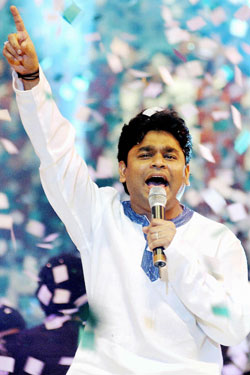
In India, fans love A.R. Rahman almost as we love David Archuleta ÔÇö and heÔÇÖs reportedly sold a few more albums: 100 million records and 200 million cassettes. A huge pop star in South Asia, heÔÇÖs famous for scoring Indian classics like Roja and Lagaan (among the dozens of other films) ÔÇö and heÔÇÖs recently begun to cross over into Hollywood with Elizabeth: The Golden Age and Andrew Lloyd WebberÔÇÖs musical Bombay Dreams. We spoke with him about his Slumdog Millionaire score ÔÇö which Fox Searchlight is pushing for an Oscar ÔÇö and his collaboration with M.I.A.
HowÔÇÖd you hook up with Danny Boyle?
I literally had to leave another film to do this. When Danny met me, he said, ÔÇ£IÔÇÖve heard a lot of your stuffÔÇÖ and he talked about it. ThatÔÇÖs about the first time IÔÇÖve heard a compliment from a Western director, apart from Andrew Webber. HeÔÇÖs a good human being.
Was it different working with him than a Bollywood director?
Usually, itÔÇÖs very different. Danny used my stuff in a very different way. I really loved the film, so I would compose pieces to fit the images, so I would do a lot of templates. With this, thereÔÇÖs not many cues in the film. Usually a big film has 130 cues. This had just seventeen or eighteen: the end credits, beginning credits, that stuff.
What were you going for?
A lot of things. I had to do stuff from modern India, eighties Hindi film soundtracks, mixing modern India and the old India.
What did Boyle suggest?
He wanted something very pulse-y. He said he hated sentiment, hated cello. No cellos! He said, ÔÇ£Never put a cello in my filmÔÇØ ÔÇö he was funny. I worked fast, like him. It took two months of planning, two weeks of completing. Usually it takes six months with the musical films IÔÇÖm doing in India.
The soundtrack really drives the film. That seems like something Boyle has in common with Bollywood. Do you think so?
WhatÔÇÖs good about [Boyle] is that he likes how Indian films mix music. You push it and it comes out. We wanted it edgy, upfront. He said every piece of music was going to be a piece by itself. Normally some directors suppress music ÔÇö they always want the effects to be loud and the music to be softer. Danny wanted it loud.
And you worked with M.I.A. on a new track.
We met before but never worked before. M.I.A., sheÔÇÖs a real powerhouse. Somebody played me her CD and I thought, WhoÔÇÖs this girl? She came here and knew all my work, had followed my work for ages. I said ÔÇ£Cut the crap,ÔÇØ this ÔÇ£my idolÔÇØ crap. You have to teach me. We started working in India, then we e-mailed the track back and forth. She did the vocals in England. I did the rest in India.
How does the filmÔÇÖs Mumbai compare to the real thing?
For me, itÔÇÖs not about India at all. ItÔÇÖs about human emotion, how we suppress so much and it all comes out. ItÔÇÖs a human film, not about India at all. The soundtrack isnÔÇÖt about India or Indian culture. The story could happen anywhere: China, Brazil, anywhere. Who Wants to Be a Millionaire is on in every damn country.

